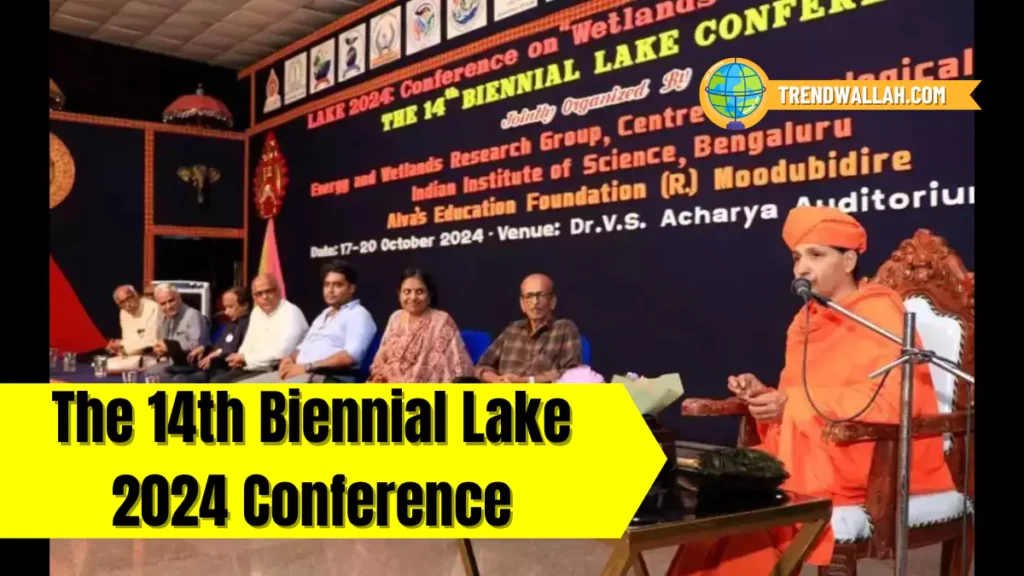
The 14th biennial Lake 2024 conference held in Moodbidri from October 17 to 20, 2024, focused on the theme “Wetlands for Human Wellbeing.” Organized by the Wetlands Research Group at the Indian Institute of Science and Alva’s Education Foundation, the event discussed critical ecological issues and proposed strong recommendations for the protection of ecologically sensitive areas.
Biennial Lake 2024 Conference Recommendations
The conference emphasized the importance of recognizing and conserving wetlands, which play a crucial role in maintaining ecosystem health and supporting biodiversity. Experts and researchers proposed the following measures:
1. Notifying Ecologically Sensitive Panchayats
The conference recommended that the government officially notify ecologically sensitive panchayats to protect these areas. This proposal aligns with Section 5(1) of the Environment Protection Act, 1986. The objective is to preserve ecosystem health through specific conservation practices.
2. Improving Biodiversity Management Committees
It was highlighted that Gram Panchayat Biodiversity Management Committees (BMCs) have not been effective since the Biodiversity Act, 2002 was enacted. The conference suggested that these BMCs should be monitored by zilla panchayats to improve their functionality and manage resources more efficiently.
3. Phased Programme Supervised by State Biodiversity Boards
A phased approach was recommended to enhance the implementation of the Biodiversity Act. State Biodiversity Boards should oversee this program to ensure better ecosystem management and support local biodiversity efforts.
4. Introducing Gross Ecosystem Product (GEP)
The conference proposed a new metric called Gross Ecosystem Product (GEP) to measure nature’s contributions to society. Unlike GDP, which does not account for ecological degradation, GEP would provide a clearer picture of ecosystem benefits.
5. Establishing Natural Capital Accounting Framework
Developing a natural capital accounting framework is crucial. This would help the government evaluate ecological benefits and integrate them into policy-making, leading to eco-compensation policies based on ecosystem services.
6. Adopting a Hydro-Centric Development Approach
A hydro-centric approach to development was recommended. This involves protecting water bodies and their catchments to ensure sustainable use of water resources. Intrusive projects that might harm these ecosystems should be avoided.
7. Formation of Western Ghats Task Force
The conference urged the creation of a Western Ghats Task Force in each peninsular Indian state. This body would work with State Biodiversity Boards to promote the conservation and sustainable use of natural resources, particularly focusing on water and biodiversity.
Biennial Lake 2024 Conference Overview
| Aspect | Details |
| Event | 14th Biennial Lake 2024 Conference |
| Theme | Wetlands for Human Wellbeing |
| Location | Moodbidri, India |
| Dates | October 17 – 20, 2024 |
| Organized by | Wetlands Research Group, Indian Institute of Science & Alva’s Education Foundation |
| Key Recommendations | Ecologically Sensitive Panchayats, GEP, Biodiversity Management, Hydro-Centric Approach |
| Proposed New Metric | Gross Ecosystem Product (GEP) |
| Focus Area | Conservation, Water Management, Biodiversity |
Biennial Lake 2024 Conference News Summary
- The Biennial Lake 2024 conference discussed the importance of wetlands for human wellbeing.
- Recommendations include notifying ecologically sensitive panchayats and improving local biodiversity management.
- Introduction of Gross Ecosystem Product (GEP) as a new metric to measure nature’s contributions.
- Development of a natural capital accounting framework to guide eco-compensation policies.
- Suggestion for a hydro-centric approach to development and formation of a Western Ghats Task Force.
Also Read Latest Current Affairs 2024
The main theme was “Wetlands for Human Wellbeing,” focusing on the conservation of wetlands and their importance to ecosystem health.
GEP is a proposed metric to measure the contributions of ecosystems to society, providing a more accurate representation of nature’s value than GDP.
Why are ecologically sensitive panchayats important?
They are essential for localized conservation efforts, ensuring ecosystem health through specific, tailored practices.
State Biodiversity Boards oversee local biodiversity management, supporting initiatives to conserve and enhance ecosystem health.
It emphasizes the protection of water bodies and their catchments, ensuring sustainable water resource management.
It is a recommended body to assist state governments in the conservation of water and biodiversity across peninsular India.
It helps in assessing ecological benefits and aids the government in making informed policy decisions that support environmental sustainability.
